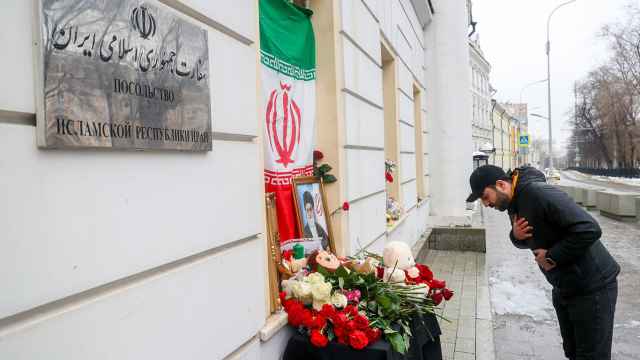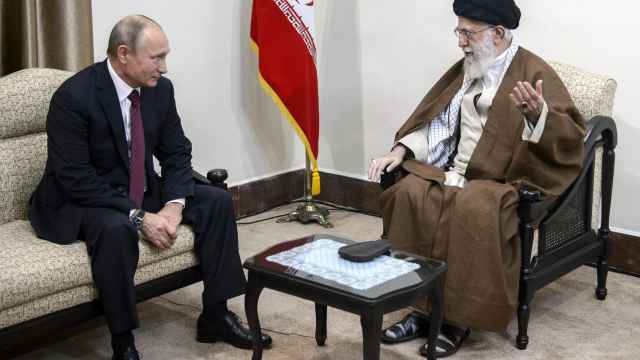"Caterers are like the stylist for a star. Important, but not in first place."
That was the comparison drawn by Elisabeth Smagin, organizer of Moscow's opulent Vienna Ball and a client of Ulei, a busy Moscow catering service, as she discussed Moscow's caterers in an interview last week.
"Unless they're bad," she continued. Then the guests "will say the whole event is — ," she said, using a word that isn't printed in this newspaper.
Andrei Kuznetsov, managing partner and general manager of Smart Catering, said the guests of his upscale catering firm don't pay much attention to his brand. "The final consumer doesn't think about us," Kuznetsov said.
Yet a catering business, just like any self-employment in Moscow, isn't for the lax. For creative individuals willing to work hard and meet high standards of service, catering offers opportunities that range from profitable part-time jobs to a chance to open their own company — eventually.
Guests need to be impressed and, to that end, Moscow's caterers often provide much more than food and drink. The add-ons can include ice sculptures, chocolate fountains, musicians and bartenders who entertain.
Caterers work hand-in-hand with a tight circle of corporate events managers and events agencies. Reputation and experience are key factors in catering, with customers returning to the caterers that show them a good time.
"The human factor is very important," said Yelena Zaitseva, special projects manager of the smaller-scale Absolute Catering. Food tastings are a large part of the job, she said, and "you have to be immersed in that atmosphere" and be charming.
What's more, the catering market is highly segmented. Catering representatives can rattle off a list of clients and events to illustrate their niche.
Client relations aren't the only connections to be maintained. The guest count at catered events can be in the dozens or the thousands, and no caterer wants to turn down a big job. That means having enough people to prep, deliver and serve.
Zaitseva, who works with a permanent staff of 10 people, said Absolute Catering has a circle of other caterers, "tried and trusted," with which it collaborates on large events. She characterized her company's clients as small and medium-sized businesses, mostly in the retail sector.
The permanent staff of a catering company consists of managers, administrators, sales representatives and head cooks or chefs. A detailed database of waiters, porters and other staff is also essential for assembling a successful team.
Some skills lead to handsome salaries. Knowing English doubles a waiter's pay, said Anna Poverennova, brand manager at powerhouse Ulei. A well-trained waiter with good English "drives a BMW and owns his own apartment in Moscow," she said.
Poverennova said that last year, 15 percent to 17 percent of Ulei's work was connected with foreign clients and companies. Most of those events were hosted by embassies, by expats in top management roles or by international companies introducing brands to Russia.
For all of its clubbiness, catering is an industry in which you can work your way to the top, interviews with Moscow's caterers suggested. As a matter of fact, that might be the only way to get a foothold.
Not many working Russians are keen to start their own business, as many caterers have done. A survey released Tuesday suggested that becoming self-employed is far less enticing now than it was pre-crisis. Of the roughly 5,600 employees surveyed in about 30 cities by recruiter Ancor Holding, the percentage of respondents who found becoming a partner or co-owner attractive dropped by more than two times from 2007 to 2010, noted Svetlana Limonova, a business development manager at Ancor.
Yet an interest in the food or service industries can be a winning factor. Kuznetsov said he "fell in love" with the restaurant industry when he began working as a waiter and bartender while studying economics.
He eventually became a restaurant manager and "conceptualist" before getting into catering. He joined Ulei, then left the firm in 2005 to found an elite caterer called Smart, which has its headquarters at the city's trendy Winzavod arts complex and a staff of 25.
It's a big jump from a restaurant to a catering business, Kuznetsov said. The philosophy is different. A restaurant can spend months in the planning stages, then close in an instant, he said, while a caterer provides tailored events, offers a lot of them and does so comparatively quickly. Yet catering companies, "sometimes large ones," open and close regularly, Zaitseva said.
Zaitseva recalled some event planners who wanted to start a catering business in 2010. It required an "enormous" investment, she said. "They would call me every day with questions," she remembered. "I would tell them things, but they're closed now."
Experience matters. When asked about planning open-air events, Zaitseva replied that "any company can do that." She added, "Well, any company that's been operating for, say, three years."
She insisted that no logistical problem was too much for the right team. But customers frequently need advice from the caterers to ensure their event goes successfully.
The Vienna Ball's Smagin agreed with that approach. "We worked with them," she said of her caterer. "They told us, 'yes, we can do that,' or 'no, we can't. … Pay attention to this, be careful of that.'" She called the guidance "enjoyable."
Ulei's catering service began around the beginning of the last decade, operating in tandem with Ulei restaurant. It has outlived the restaurant by three years now. Poverennova said most of Ulei's staff — it has 85 permanent workers — come from Moscow's international hotels.
The catering industry, which emerged in Russia at the end of the 1990s, grew explosively as corporate culture took on greater refinement. But the financial crisis predictably took a toll.
Caterers spoke of the days before the crisis in hushed, almost dreamy, tones of nostalgia. The field was hit hard as major companies, feeling anything but festive, cut their entertainment budgets or froze them.
The large caterers tried to provide new services and "optimization of budget in the creative experience," Kuznetsov said. However, "we had to maintain the level of quality to preserve our reputation," he said.
Absolute Catering's relatively modest scale could have been one factor that helped it survive the economic downturn. While corporate events all but dried up, Zaitseva said, the company continued to cater private events, such as weddings and birthdays. "Russians love to celebrate," Zaitseva said.
Still, her employer was forced to relocate outside Moscow.
Zaitseva estimated that there are 200 catering companies of various sizes in Moscow today. Despite the entrenched names in the highest echelon of the industry, there is room for newcomers on the reviving market, she said.
"We asked what people wanted," Ulei sales manager Ksenia Bolotskaya said. "Now our clients are our friends. ... We beat the crisis."
Staff writer Rachel Nielsen contributed to this report.
A Message from The Moscow Times:
Dear readers,
We are facing unprecedented challenges. Russia's Prosecutor General's Office has designated The Moscow Times as an "undesirable" organization, criminalizing our work and putting our staff at risk of prosecution. This follows our earlier unjust labeling as a "foreign agent."
These actions are direct attempts to silence independent journalism in Russia. The authorities claim our work "discredits the decisions of the Russian leadership." We see things differently: we strive to provide accurate, unbiased reporting on Russia.
We, the journalists of The Moscow Times, refuse to be silenced. But to continue our work, we need your help.
Your support, no matter how small, makes a world of difference. If you can, please support us monthly starting from just $2. It's quick to set up, and every contribution makes a significant impact.
By supporting The Moscow Times, you're defending open, independent journalism in the face of repression. Thank you for standing with us.
Remind me later.






